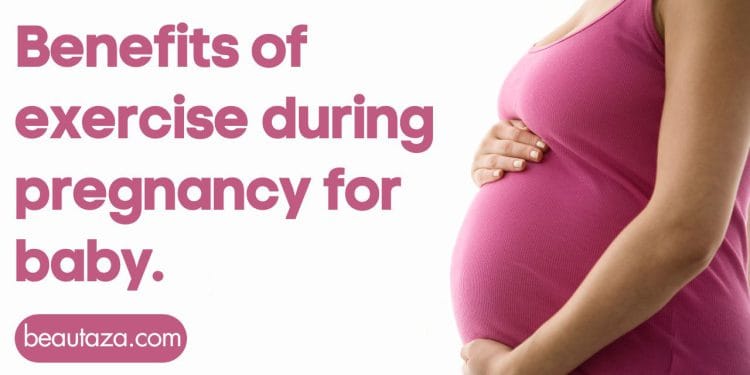
I will discuss the Benefits of exercise during pregnancy for the baby in this blog post. A woman’s pregnancy is a lovely and life-changing event. A fascinating journey in which a tiny embryo grows and develops into a priceless human life starts with conception. When pregnant, you decide to protect your unborn child’s health and the best possible growth. Exercise is a vital component that shouldn’t be ignored.
Exercise has long been known to have many health advantages, but it also has a good effect on the unborn child when pregnant.
Enhanced Oxygen and Nutrient Supply
During pregnancy, the placenta is essential to how your baby gets food. Air, nutrition, and waste move through it, connecting you and your baby. Regular exercise can significantly improve this exchange, ensuring your baby gets enough air and nutrients for healthy growth and development.
When you work out, your heart rate goes up. This makes your blood flow better all over your body, including the placenta. This means your baby will get more oxygen and essential nutrients because of more blood flow. So, your baby receives a steady amount of the building blocks he or she needs for good growth.
Stronger Fetal Musculoskeletal System
Exercise during pregnancy is suitable for your muscles and joints and helps your baby’s muscles and joints thrive. You can help your baby’s bones and muscles grow strong and stay fit by doing the correct movements.
The body produces bone-building hormones during exercise. Your baby also goes through these chemical changes, which help him or her build stronger bones and a better muscular system. Strong bones are essential for your baby’s growth and give them a strong base for their future physical activities.
Also, daily exercise helps tone and strengthen your muscles and those of your baby. When you move, your muscles contract, sending light vibrations to the baby. Your baby’s muscles get “exercise” from these movements, which helps them grow and develop.
Low-impact exercises work different muscle groups that help the unborn muscles and bones grow more robust. Yoga for pregnant women, light muscle training, and routines for the pelvic floor are beneficial. These routines help you build up your muscles and give your baby’s muscles a gentle workout.
Workouts should be performed with the appropriate form and expertise, and activities that place undue stress on the joints or increase the risk of tripping and falling should be avoided. Listen to your body and talk to your doctor or midwife about what workouts are safe and suitable for you during pregnancy.
Reduced Risk of Gestational Diabetes
Gestational diabetes is characterized by persistently high blood sugar levels throughout pregnancy. It may have severe consequences for the mother and the child. The risk of acquiring gestational diabetes, however, may be decreased with regular activity throughout pregnancy.
Exercise is essential for keeping good blood sugar levels because it makes insulin work better. When you work out, your muscles use glucose for energy more efficiently, lowering the sugar in your blood. This makes the body more sensitive to insulin, which can help avoid or control gestational diabetes.
By staying active daily, you can lower your risk of gestational diabetes. As a result, the likelihood of complications from the illness is reduced.
Improved Brain Development and Cognitive Function
Regular exercise while pregnant is suitable for your physical health and helps your baby’s brain grow and function. The increased blood flow and growth factors released during exercise are responsible for its positive effects on brain health and development.
Also, exercise brings more blood to the brain, which brings more oxygen and chemicals that the brain needs to grow and develop well. This makes it easier for new blood vessels to grow and for essential links between brain cells to form.
To help your baby’s brain grow, do exercises that improve blood flow and trigger the release of neurotrophic factors. Activities like swimming, dancing, and pregnancy yoga that increase your heart rate are beneficial.
Lower Risk of Excessive Fetal Weight Gain
During pregnancy, it’s essential for both the mother and the baby that she stays at a healthy weight. Macrosomia is the medical term for when a fetus gains too much weight. This can increase the risk of problems during delivery and affect the baby’s health in the long run. Luckily, regular exercise during pregnancy can help control the weight gain of the fetus and help ensure a healthy birth.
Exercises focusing on physical health and burning calories are perfect for controlling baby weight gain. The best choices are walking, swimming, low-impact exercises, and pregnant yoga. These things help you stay busy while putting less stress on your joints and giving your whole body a gentle workout.
Exercise not only helps you control your weight, but it also helps you keep your blood sugar under control. Exercise helps control blood sugar levels by making insulin more sensitive. This lowers the risk of gestational diabetes and its consequences, such as too much weight gain in the baby.
To control baby weight gain, it’s important to remember that keeping a balanced and healthy diet is just as important.
Enhanced Emotional Well-being for the Mother
When a woman is pregnant, she goes through a lot of mental and physical changes. It’s normal for women who are expecting to feel more stress, worry, and even signs of sadness. But regular exercise while pregnant can help your mental health and indirectly help your baby’s emotional health.
Endorphins, also called “feel-good” hormones, are known to be released when you work out. These endorphins help lower stress, boost happiness, and make you feel good about yourself. By working out regularly, you can successfully deal with worry and improve your mental health while pregnant.
Conclusion
You, the pregnant mother, shape your child’s development. Regular exercise helps pregnant moms and their newborns. Healthy physical activity may benefit your child’s development.
Exercise boosts oxygen and nutrition flow to the placenta, nurturing your baby. It strengthens bones and muscles for future health. Gestational diabetes may be prevented by exercise. Exercise boosts your child’s brain and nervous system development.
Regular exercise may reduce macrosomia and delivery issues. Training and prioritizing mental health create an excellent example for your youngster.
Before starting or expanding your fitness program, consult your doctor. Each pregnancy is different. They can personalize recommendations to your scenario and evaluate risks.
Exercise throughout pregnancy to benefit you and your baby. Safe daily physical activity improves cardiovascular fitness, strength, and mental health. Self-care helps your baby grow.
Read –










